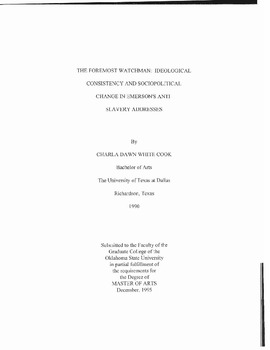| dc.description.abstract | The most common critical perceptions concerning the career of Ralph Waldo Emerson have tended to emphasize the strength and originality of his earliest, and seemingly most influential, works. Nature, published in 1836, and the compositions contained in Essays, First Series and Essays, Second Series, published in 1841 and] 844 respectively, provide the foundation upon which Emerson's transcendental philosophy is erected: Emerson hereby introduces a uniquely American agenda that espouses original and independent notions with regard to the individual, his role in society, and the fundamental need for self-determination. Nature, "History," "Circles," "The Poet," "Experience," and "Self-Reliance," as well as the texts of "The American Scholar." "Man the Reformer," and other seminal works are readily found in any good volume of Selected Essays, a condition which understandably serves to reinforce inherited assumptions that Emerson's was a life and career which was, as Larzer Ziff contends, "punctuated by the excitement of ideas rather than events" | |
